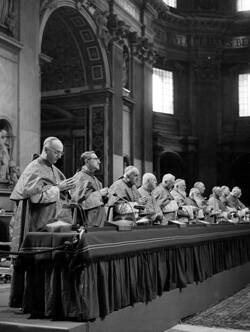It was appropriate that the first "father" to win wide attention at the Second Vatican Council should be the bishop of Lille, Achille Cardinal Lie´nart. Not only is his native France the "Eldest Daughter" of the Church, but he—though by no means the oldest member—is outdistanced only by Portugal's Manuel Cardinal Gonc¸alves Cerejeira in tenure within the College of Cardinals. His title dates from 1930.
Even had he not intervened at the start of the first working session with a request for adjournment to permit the bishops to canvass candidates for election to the Council's commissions, Cardinal Lie´nart would have shared the spotlight. As a member of the board of "presidents" designated by Pope John to insure orderly procedure in debate on the floor of the Council, he would inevitably become well known to the assembled bishops and to the onlooking world as events unfold in Rome.
An editorial in the October 15 issue of the V atican newspaper Osservatore Romano reminded readers that history suggests the debates in Second Vatican—as this Council is called—may become "heated and lively." One can expect, we are told, the emergence of what in parliamentary parlance are usually called "Center, Right- and Leftwing parties" and "an opposition." Obviously, such analogies borrowed from secular political assemblies can be misleading. In the interest of efficient organization, it is clear, however, that the Council will have to rely on a system of committees and an agency, such as the board of presidents, that have functions similar to those of our House Rules or Ways and Means Committee.
In view of the role the ten Cardinals named as presidents may be called on to play in the Council, it will help to know a little about their backgrounds.
EUGENE TISSERANT, 78 years of age: outstanding linguist and expert on antiquities; dean of the College of Cardinals as senior Cardinal Bishop; secretary for many years of the Oriental Congregation and now head of the Congregation of Ceremonies; a Frenchman, his life's work has been in Rome, but he is widely traveled; recently elected to the famed French Academy.
ACHILLE LIE´NART, 78: former professor of Scripture; bishop of Lille and prefect of the "Mission de France"; strong interest in social questions such as rights of workers; recognized as a leader of French hierarchy.
IGNACE TAPPOUNI, 83: Syrian Patriarch of Antioch since 1929; though other Eastern prelates have been more outspoken, he can be regarded as a capable advocate of viewpoint of Orientals.
NORMAN GILROY, 66: wireless operator in service during World War I; first native Australian Cardinal; a bishop at 38, now archbishop of Sydney, he symbolizes a fully acclimated Australian Catholic mentality.
FRANCIS SPELLMAN, 73: Served in Vatican Secretariat of State and as editor and pastor; archbishop of New York and head of U.S. military Ordinariate; one of most widely traveled and best-known churchmen of the century, he is esteemed an outstanding administrator and bold spokesman for the Church's interests.
ENRIQUE PLA Y DENIEL, 86: former seminary professor and author; archbishop of Toledo and Primate of Spain; proponent of Catholic action and powerful friend to Catholic workers' associations, unflinching defender of freedom of Catholic press; an independent figure.
JOSEPH FRINGS, 75: former seminary professor; archbishop of Cologne; authored the German Gatholic "Misereor" program of technical aid to underdeveloped lands; a dominant factor in German hierarchy, he is concerned with promoting lay action and Protestant-Catholic understanding.
ERNESTO RUFFiNi, 74: former Scripture professor, served for years on Roman Congregations; now archbishop of Palermo; has issued stern warnings on political contacts with Communists in Sicily and has reacted strongly and publicly against modern trends in biblical scholarship.
ANTONIO CAGGIANO, 73: former seminary professor, most influential in expanding Catholic Action organizations in Argentina; son of Italian immigrants, now archbishop of Buenos Aires; prominent in public life for opposition to Peronist attacks on Church in 1955 and for settlement of national railroad strike in 1962.
BERNARD ALFRINK, 62: former Scripture professor and author; archbishop of Utrecht and head of Dutch military Ordinariate; has led Catholics of the Netherlands in lively concern about affairs of the Council; his comments have drawn international attention at every level.








